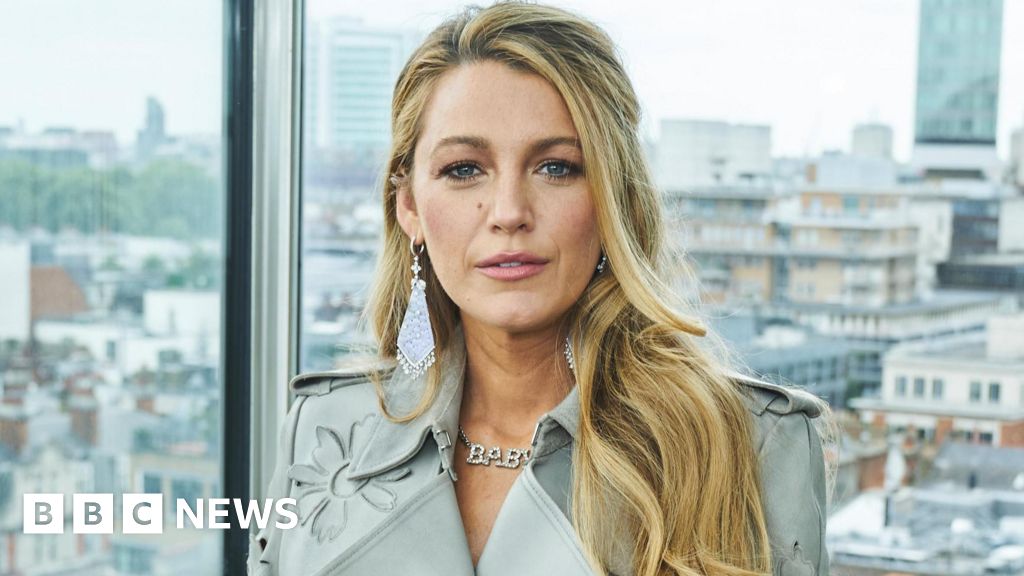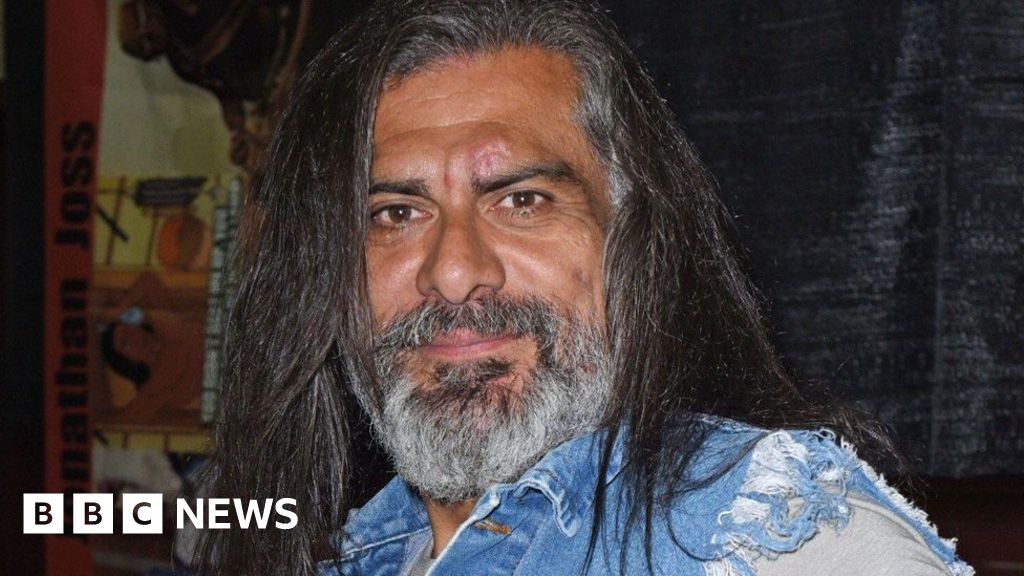ARTICLE AD BOX
By Steven McIntosh
Entertainment reporter
image sourceQuantrell D. Colbert
image captionDirector Liesl Tommy (right) had a distinguished career in theatre before making her feature film debut with RespectBefore her death in 2018, Aretha Franklin personally selected Jennifer Hudson to play her in Respect, the new biopic released in the UK this weekend. But even if the queen of soul hadn't left behind such a clear instruction, you get the impression producers might have picked Hudson anyway.
Already an Oscar winner for her performance in the Supremes-inspired musical Dreamgirls, Hudson was a natural and fitting choice. Not only could she sing and act, but she had performed a Franklin song in her audition for American Idol, the show which catapulted her to fame in 2004.
For Hudson, now 39, accepting the role was a no-brainer - not that she ever found out why the great lady had chosen her. "You know what, that is the one question I failed to ask," she tells BBC News. "She never specified, she just said, 'Jennifer I want you to play me', and I said, 'Yes ma'am, I will!'
"But I think it went beyond singing and acting," she continues. "I feel as though she saw so much more that we may have experienced or paralleled in some way." Hudson highlights their shared religious faith and personal struggles while in the public eye. "Coming from such a vulnerable place, I needed to draw from my own experiences to be able to tell her story."
Franklin achieved music's highest possible honours across her six-decade career - she won 18 Grammys, was inducted into the Rock & Roll Hall of Fame in 1987 and awarded the Presidential Medal of Freedom by George Bush in 2005.
image sourceReuters
image captionAretha Franklin died in 2018 aged 76 after a battle with cancerShe sold more than 75 million records worldwide, driven by chart hits such as Think, Respect, I Say A Little Prayer and You Make Me Feel Like A Natural Woman.
"There are certain musicians, and she's one of them, where I think you learnt about her in the womb," laughs director Liesl Tommy. "Because there's no memory of not knowing her music, right? She has an evocative song for every single moment of your life, so the love just kind of deepens as you grow up and your sensibilities become more sophisticated."
"Her music is so timeless," agrees Hudson. "And it's everywhere you turn. She's always been one of my favourites."
Franklin and Hudson were in close contact in the early stages of the movie's production. "We spoke right up until the point she passed, leading up to the film, preparing to play her," explains Hudson. "Unfortunately she wasn't here when we started to film, but we had many conversations, to the point where I miss hearing from her, because I would hear from her weekly."
Mixed reviews
The pair's relationship grew closer after their initial conversation about the role, with Franklin offering Hudson advice about her life and career while also teaching her about her own.
Tommy, who joined the project after Hudson's casting, notes: "Once I met Jennifer and realised how much humanity and sensitivity she had in addition to this incredible voice, I came to understand that Aretha Franklin really knew what she was doing with that casting choice."
Early reviews of the movie have been mixed - although most critics have broadly praised the leading performance. "Respect is not a perfect film, but it's also not your typical biopic, and certainly is worth your attention," wrote Vanity Fair's Cassie da Costa. "It's more effective as a jukebox musical than a character piece, but the central performance and those amazing songs pull it all together," added The Wrap's Elizabeth Weitzman.
"[Hudson] hits a few high notes in a film beset by the usual biopic tropes and shortcuts," suggested IndieWire's Kate Erbland. There was less enthusiasm from from Mark Kennedy of the Associated Press, who said: "If you come for the queen, you best not miss. This is a miss."
image sourceQuantrell D. Colbert
image captionForest Whitaker plays the singer's father Clarence LaVaughn Franklin, a Mississippi-born pastorHudson doesn't actually appear in the first movement of the movie, which focuses on Franklin's childhood. In these early scenes, we see the young Aretha, who everyone calls Ree, regularly encouraged to sing by her family - particularly her father (Forest Whitaker). Ree is invited to perform at the dinner parties hosted by the family and hones her craft while sitting at the piano with her mother.
Fans of contemporary R&B will particularly enjoy the scenes Hudson shares with Mary J Blige, who plays Dinah Washington - the legendary soul and jazz vocalist who was a friend of Franklin's family. She advises and encourages Franklin, although the relationship between the pair becomes strained in later scenes.
For the musical numbers, Hudson had to strike a delicate balance between mimicking Franklin while also giving the songs her own interpretation using her distinctive voice. "Musically, it's like, who can imitate Aretha, really?" she says. "So it was about allowing her influence that she's had on me to come through, while using her nuances and inflections that are so familiar to us all throughout her classic records."
Unusually for a film in the musical biopic genre, all the songs were performed live, on set. The performances viewers see are not mimed to a studio recording that was made in advance and preened to perfection with editing.
That, in turn, made the whole process more reflective of how music was recorded in the 1960s. "They recorded differently back then," notes Hudson. "Their process was recording live. Whereas ours is more digital or processed, but it's inspired me to want to approach my own music that way."
image sourceQuantrell D. Colbert
image captionMary J Blige (right) plays singer Dinah Washington, who offered career advice to FranklinShe adds: "When it came to finalising the soundtrack, that was when I realised, 'This is done differently than any film with music', because I've been blessed to do quite a few of them. Normally you go in and pre-record the soundtrack. Whereas it happened the opposite way here, so we did it all there while we were shooting the scenes. Then when it was transferred over to the record label to release the soundtrack, it was like, what is there left to do?"
Despite never having directed a feature film before, producers were confident that Tommy, a distinguished theatre director, was the right person to bring Respect to fruition.
"I had a very clear idea about what it should be," she recalls. "I proposed that it start in the church. And what I basically pitched was it should be a woman with the greatest voice in the world who is struggling to find her voice."
Taking on a film as high-profile of this is quite an extraordinary feat for someone making their film debut. "The fact that I was tackling the Aretha Franklin story was almost absurd, almost a joke, that I would choose to make that my first feature film," Tommy acknowledges.
"But at the same time, I did feel that I had been preparing my entire career for this film. In terms of working with music and musicians in the theatre, understanding what goes on in a rehearsal room, all of those things, I just felt like, every single bit of this film, I understood how to tell the story."
image sourceQuantrell D. Colbert
image captionCritics have largely praised Hudson's performance while giving the film mixed reviews overallThe film didn't jump to a streaming service during Covid, unlike many others, and will instead enjoy a full cinema release. Hudson says that makes it feel more like going to a concert, while Tommy notes: "Aretha Franklin really wanted a big fancy movie about her life, and I really wanted that for her, people should see it on a big screen where they can hear the glory of that sound design."
The film has inevitably attracted Oscars buzz, despite the ceremony being six months away. Hudson could well be in line for a best actress nomination, but she plays down the suggestion. "I just try to do the work," she says humbly. "And with the pressures of Respect? Honey, I can't even begin to think of anything else."

 3 years ago
135
3 years ago
135








 English (US) ·
English (US) ·